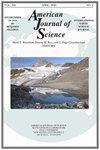亚利桑那州西北部∼1740 Ma Vishnu片岩中富含2480 Ma锆石:源自马塔切万大型火成岩省?
IF 1.9
3区 地球科学
Q3 GEOSCIENCES, MULTIDISCIPLINARY
引用次数: 0
摘要
亚利桑那州西北部∼1740-1750 Ma Vishnu片岩及类似岩石单元中的碎屑锆石颗粒中,有多达30%的颗粒通过U-Pb同位素分析被测定为2470-2490 Ma。这些锆石颗粒分布在 ∼ 40,000 平方公里的范围内,其年龄峰值为 2480.0 ± 27.3 Ma (2SE)。与其他年龄的锆石相比,这些锆石的 207Pb/206Pb 年龄异常一致,分析的不确定性较小,与理想的 U-Pb 演化更为一致。该锆石群的加权平均年龄为 2480 ± 0.9 Ma(2SE),反映了一致的分析结果和较高的分析精度,但并不反映年龄的准确性。这些锆石的来源尚未确定。为了更好地确定不明来源的特征,我们用激光烧蚀质谱仪分析了其中 45 个晶粒的痕量元素和稀土元素,并用电子显微镜扫描了 16 个晶粒,以确定矿物包裹体。质谱仪对 Sc/Yb 和 Nb/Sc 的测定结果表明,这些矿石来源于大洋岛屿火成岩。电子微探针扫描显示,16 个晶粒中有 5 个含有石英,表明其来源于长英岩。207Pb/206Pb 日期的低变异性以及 U 和 Th 之间的线性关系支持锆石来源于单一火成岩单元或无异质锆石的一组密切相关的单元。通过文献检索,我们在蒙大拿州西南部的中新生代(?)元古代砂岩和砾岩中发现了具有相似年龄和U/Th比的其他锆石群,其中有2480 Ma锆石。这种砂岩沉积于怀俄明克拉通边缘附近,几乎全部含有2400-3600 Ma锆石,这与毗湿奴片岩中的锆石颗粒不同,后者含有大量1730-1900 Ma锆石。根据这种关系,我们推断这两个地区的 2480 Ma 锆石都来自怀俄明克拉通。我们的结论是,2480 Ma Vishnu锆石来源于在2450-2480 Ma Matachewan大火成岩省相关热点岩浆之上形成的长英岩,该岩床是由地幔衍生的热点岩浆与同化的阿切安大陆地壳混合形成的,而源岩则是在怀俄明陨石坑与苏必利尔省之间的初始断裂过程中形成的。本文章由计算机程序翻译,如有差异,请以英文原文为准。
Abundant 2480 Ma Detrital Zircons in ∼1740 Ma Vishnu Schist in Northwestern Arizona: Derivation From the Matachewan Large Igneous Province?
Detrital zircon grains in the ∼1740–1750 Ma Vishnu Schist and similar rock units in northwestern Arizona consist of up to 30% grains dated by U-Pb isotopic analysis at 2470–2490 Ma. These zircon grains are distributed over ∼40,000 km2 and define an age peak at 2480.0 ± 27.3 Ma (2SE). These grains have yielded unusually consistent 207Pb/206Pb dates, with generally smaller analytical uncertainty and greater concordance to ideal U-Pb evolution than grains of other ages. A weighted mean age of 2480 ± 0.9 Ma (2SE) for this zircon population reflects consistent analytical results and high analytical precision but not the accuracy of the age. The source of these zircons has not been identified. To better characterize the unidentified source, we analyzed 45 of these grains for trace and rare-earth elements by laser-ablation mass spectrometry and scanned 16 grains with an electron microprobe to identify mineral inclusions. Mass spectrometer determinations of Sc/Yb and Nb/Sc support derivation from an oceanic-island igneous source. Electron microprobe scans revealed quartz in 5 of 16 grains, indicating a felsic source. The low variability in 207Pb/206Pb dates and a generally linear relationship between U and Th support zircon derivation from a single igneous unit or closely related set of units without xenocrystic zircons. A literature search for other zircon populations with similar age and U/Th ratios identified ∼2480 Ma zircons in a Mesoproterozoic(?) metapsammite and conglomerate in southwestern Montana. This sandstone was deposited near the margin of the Wyoming craton and contains almost entirely 2400–3600 Ma zircons, unlike zircon grains in Vishnu Schist which include a large population of 1730–1900 Ma zircons. From this relationship we infer that the 2480 Ma zircons in both areas were derived from a source in the Wyoming craton. We conclude that the 2480 Ma Vishnu zircons were derived from a felsic batholith that formed above and from hotspot magma related to the ∼2450–2480 Ma Matachewan Large Igneous Province, that this batholith formed by mixing between a mantle-derived hotspot magma and assimilated Archean continental crust, and that the source rock was emplaced during initial rifting between the Wyoming craton and the Superior province.
求助全文
通过发布文献求助,成功后即可免费获取论文全文。
去求助
来源期刊

American Journal of Science
地学-地球科学综合
CiteScore
5.80
自引率
3.40%
发文量
17
审稿时长
>12 weeks
期刊介绍:
The American Journal of Science (AJS), founded in 1818 by Benjamin Silliman, is the oldest scientific journal in the United States that has been published continuously. The Journal is devoted to geology and related sciences and publishes articles from around the world presenting results of major research from all earth sciences. Readers are primarily earth scientists in academia and government institutions.
 求助内容:
求助内容: 应助结果提醒方式:
应助结果提醒方式:


